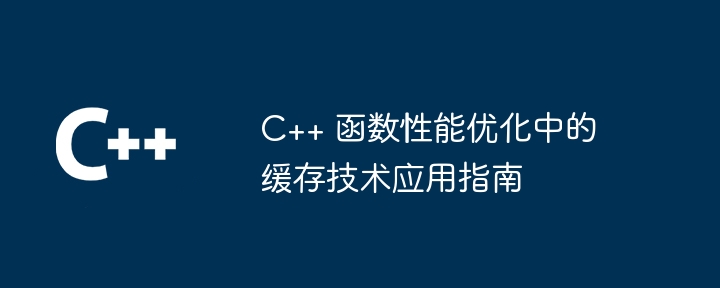
Application caching technology is an effective way to improve the performance of C functions. Through inline functions, object pools and function pointer caching, the overhead of function calls and the cost of memory management can be significantly reduced. Among them, the object pool avoids frequent memory allocation and release by pre-allocating and storing objects, effectively improving function execution speed.

Cache is a technology used in computers to improve data access speed. In C function performance optimization, applying caching technology can significantly improve the execution efficiency of the function.
The principle of caching is to store frequently accessed data in a quickly accessible memory area. When data needs to be accessed, the system first checks the cache, and if the data exists in the cache, it reads directly from the cache, which is much faster than reading the data from a slower memory area such as main memory.
In C functions, caching technology can be applied in the following ways:
The following is a practical case of using object pool to improve the performance of C function:
// 对象池类
class ObjectPool {
public:
ObjectPool(int maxSize) : maxSize(maxSize) {}
// 获取一个对象
Object *getObject() {
if (!freeObjects.empty()) {
Object *object = freeObjects.back();
freeObjects.pop_back();
return object;
}
if (objects.size() < maxSize) {
Object *object = new Object();
objects.push_back(object);
return object;
}
return nullptr;
}
// 释放一个对象
void freeObject(Object *object) {
freeObjects.push_back(object);
}
private:
std::vector<Object *> objects;
std::vector<Object *> freeObjects;
int maxSize;
};
// 使用对象池的函数
void function() {
ObjectPool pool(100);
for (int i = 0; i < 1000000; i++) {
Object *object = pool.getObject();
// 使用对象
pool.freeObject(object);
}
}Without using object pool, each call getObject will allocate a new object and call the new and delete methods, which will generate a lot of overhead. By using the object pool, objects are pre-allocated and stored in the pool, thereby reducing the overhead of memory allocation and release, and significantly improving the execution speed of the function function.
The above is the detailed content of Caching technology application guide in C++ function performance optimization. For more information, please follow other related articles on the PHP Chinese website!
 What are the differences between c++ and c language
What are the differences between c++ and c language
 Recommended learning order for c++ and python
Recommended learning order for c++ and python
 Cost-effectiveness analysis of learning python and c++
Cost-effectiveness analysis of learning python and c++
 Is c language the same as c++?
Is c language the same as c++?
 Which is better to learn first, c language or c++?
Which is better to learn first, c language or c++?
 The difference and connection between c language and c++
The difference and connection between c language and c++
 C++ software Chinese change tutorial
C++ software Chinese change tutorial
 Cost-effectiveness analysis of learning python, java and c++
Cost-effectiveness analysis of learning python, java and c++




